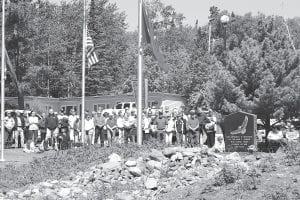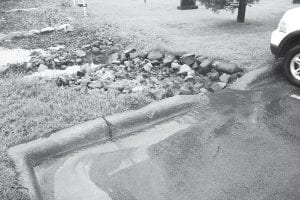Many of the hundred-plus attendees of the Memorial Day ceremony at the Cook County courthouse expressed displeasure that a rain garden had been constructed so close to the Cook County Veterans Memorial. Left: On Friday, June 4, just over half an inch of rain fell and it appeared that the rain garden was doing what it is supposed to do. However, only the top two sections of the tiered ponds had water in them.

Don Wilson, commander of American Legion Post 413, does not think the rain garden installed outside the courthouse last summer is a suitable addition to the grounds upon which Cook County’s Veterans Memorial stands. He was not alone in his thinking about the new look of the courthouse lawn at the Memorial Day ceremony May 31.
At the county board meeting on Tuesday, June 8, 2010, Wilson relayed the disappointment expressed by many after they stood within the semi-circle of flags bordered by ragged weeds choking out new grass on a berm around the perimeter of the rain garden. Also at the meeting were county Maintenance Director Brian Silence, Soil & Water Conservation District Supervisor Joan Farnam, and Soil & Water Conservation Technician Tristan Beaster, who wrote the Minnesota Board of Water and Soil Resources (BWSR) grant that paid for 75% of the rain garden,
The rain garden is one of several built around the City of Grand Marais to capture pollutants, mostly from vehicles, that would otherwise be carried along driveways and streets and end up in the harbor. Rain gardens are a natural way to remove toxins from ground water.
Unfortunately, the garden ended up being bigger and closer to the Veterans Memorial than some people imagined it would. And the grass that was planted around it has had difficulty taking root while weeds have not. The variety of plants planned for the different moisture levels expected in the garden’s numerous levels do not yet fill the earthen cavity.
Don Wilson was respectful but direct. He considers the Veterans Memorial “hallowed ground” and believes the rain garden should go. Thatarea has never had a runoff problem anyway, he said. “That lawn out there will absorb a lot of water,” he said. A memorial service was cancelled in 2004 on a day that brought three inches of rain, he said, and all the water from that rainfall absorbed into the grass. “If we ever get enough rain to fill up that lower level, Grand Marais is in trouble.”
Commissioner Fritz Sobanja was the first to respond. Thegarden ended up being bigger than it had looked on the drawings, he said, and it hasn’t been kept up properly. He pointed out that he had asked Soil and Water to consult with the American Legion before going ahead with the project and concurred with Wilson that the Veterans Memorial has historic meaning for the county.
Sobanja asked Wilson if local veterans had been consulted. Wilson said he had a brief discussion of the project with Brian Silence. Drawings of the project did not show the garden as close to the flagpoles as it ended up being, he said, and the original plan placed the garden east of where it is.
“I have the utmost respect for veterans in this community,” Tristan Beaster said,
and I’m sorry it turned out this way.” He believed they could come up with a solution that would satisfy everyone. The east location was not workable because of snow removal issues. He had not been aware of any major concerns raised when Silence had spoken with Wilson about the project.
A June 3, 2009 email from Silence to Beaster says, “I talked with Don Wilson today. He had a couple of concerns about the project, nothing too serious. I told him we would have a final plan soon.”
The rain garden was planned carefully, Beaster said. It would take a major rainfall to fill up the third and lowest basin, he said. The plants will eventually mature, and the grass will establish itself. Beaster said he saw three options:
1) Work with the current design to soften the visual effect near the memorial.
2) Resize and reshape the garden, making sure it wouldn’t fail in the event of a large rainfall.
3) Remove the rain garden completely. This would require the county (but not Soil & Water) to pay BWSR 150% of amount of the grant. The garden was originally expected to cost $6,831, but the final cost was $15,264 including a county cash match of $2,108. The grant amount was $11,448, so a 150% payback would be $17,172.
Commissioner Bruce Martinson reminded Sobanja that he had seconded a motion on May 27, 2008 to approve the original contract with the state. Martinson recommended modifying the garden and suggested planting some bushes around it. “It did look bad now, with all the weeds,” he said.
Brian Silence agreed the rain garden looked “hideous” for the Memorial Day ceremony. “I apologize for that,” he said. He had Tim Morse mow the lawn for the event, but Morse left the weeds around the perimeter because he thought they might be some of the plants that were intended to be there.
Commissioner Sobanja expressed concern about spending money trying to fix the rain garden’s appearance with no guarantee that the efforts would work and wondered how much maintaining the garden would cost the county over time. The garden was not really necessary, he said, and it didn’t have to be installed just because grant money was available.
Commissioner Bob Fenwick said the board would not have gone along with the idea if they knew people would consider it inappropriate. He said he would like to find a way for the garden to enhance the appearance of the memorial rather than detract from it, and he wanted input from veterans in making the garden look right.
Wilson said he does not want the county to throw more money at a bad idea. He said he thinks it’s time they cut their losses and run.
Is the county committed to keeping the rain garden a certain way for a certain length of time? Martinson wondered.
The county is committed to maintaining the garden for 10 years, Beaster answered.
Commissioner Sobanja offered to take his Cat down to the courthouse and level the garden himself.
That would cost the county $17,000, Farnam said.
Redesigning and maintaining the garden could cost that much, Commissioner Jan Hall said.
Keith Anderson, who designed the garden, would have to come up from Duluth if they wanted help in redesigning it, Sobanja said. A lot of people are making money off this type of thing, and creating things like this ensures their own jobs, he said, adding that the county should be thinking of its own people instead. He recommended returning the money to Bws R and saying, “Thisjust didn’t work in our community.”
“I lost count of the number of people who came up to me and said, ‘What in the world happened to our lawn?’” Wilson said. “I hope you will come to a solution that will be the right solution. …If you were to poll 200 people in the county who know about it, I think you would have 200 people who would say, ‘Get rid of it.’”
Commissioner Bob Fenwick said he would be okay with tearing out the garden – he thinks it looks terrible – but he would like to determine if it could be incorporated in a better way with the memorial. He would not have approved the project if he had known there would be so many objections, he said.
When it was presented to them, Commissioner Hall said, it was presented as “low scale, low cost.”
“I’m just as disappointed as everybody else in how things turned out,” Commissioner Jim Johnson said, adding that he thinks they made a mistake. He believes they need to respect the sanctity of the memorial.
Some people objected to the memorial when it was installed, Board Secretary Janet Simonen said.
Water running off parking lots contaminates Lake Superior, Joan Farnam said, and there is a push across the country to protect the Great Lakes. She admitted that the garden didn’t turn out how the Soil & Water board had envisioned it either.
Tristan Beaster agreed to work on ideas to modify the garden. After the meeting, Commissioner Martinson went out to the garden with Don Wilson and they discussed some possibilities that Martinson thought Wilson might find acceptable.
Later in the meeting, Personnel Director Janet Simonen reported that Beaster had tendered his resignation. He will be leaving in August to pursue a master’s degree in environmental engineering from Michigan Tech.



Loading Comments